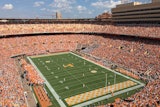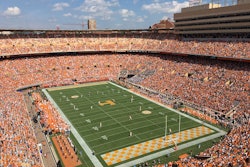A product-placement expert sees opportunities for sports properties to gain exposure on both the big and small screens
In the credits of this spring's hit Paramount feature "Failure to Launch," John Meindl is listed as "advisor: paintball product placement," "advisor: paintball wardrobe" and "paintball coordinator." "I'm not a paintball player," admits the former sport marketing professor (Adelphi University), retired head men's soccer coach (Catholic University) and one-time executive film producer (of last year's paintball-inspired "Court Jesters," named best drama at the 2006 Action On International Film Festival in July). Yet, Meindl left the "Launch" set last year convinced that a niche existed for the placement of sports-specific product of all kinds on screens both big and small. So last September Meindl launched Sportsbrandedmedia, a company that unites lower-profile sports properties - from paintball equipment manufacturers to minor-league baseball franchises - with film and television studios. Paul Steinbach asked Meindl, 39, to explain his newfound career focus.
Q: Did the inclusion of a scene in "Launch" featuring a New Orleans Zephyrs baseball game factor into your personal business vision?
A: I already knew that there was a value for minor league teams in motion pictures and television, and I also knew that the minor leagues were not aware of it. The minor leagues always think they play second fiddle, when in fact what they have is very desirable.
Q: Why can't minor league teams picture themselves on the big screen?
A: Whereas huge multinational corporations can pay millions of dollars to do a deal with a studio over 10 years, a minor league team doesn't have that kind of budget. And you can certainly get Coca-Cola in a lot more films than a minor league team, especially when you take into consideration the regional factors involved in movie making.
Q: "Launch" wasn't a sports movie, per se, but does Hollywood's love affair with sports facilitate the placement of sports product?
A: Every production set in modern times contains sport. It may not be live action, but rather the way we dress in the United States - baseball caps, sweatsuits, tennis shoes. It would be totally unrealistic to shoot a film today without somebody wearing sports-related clothing, unless the entire movie took place in a corporate boardroom.
Q: Wonder Bread reportedly paid nothing to appear in this summer's NASCAR spoof "Talladega Nights," but the exposure is estimated to be worth $100 million. How common is that?
A: There's a big myth that surrounds product placement. The vast majority of stuff you see in a film is there for free - probably 90 percent of it. The only cost to manufacturers is the merchandise they provide. There was a guy on MTV who used to wear a John Deere hat. As a result, John Deere created a licensing and merchandising department. Granted, that's one in a million, but the possibilities are there.
Q: As the middleman in these types of deals, what's in it for you?
A: There is a one-time fee based on the size of the property, but it begins at $1,000 a year. I could place a minor league team today, and it could wind up being the focus of a major motion picture, but my company is not entitled to anything on the back end. Everything is talked about up front regarding product placement - and the fact that there are no guarantees.





































